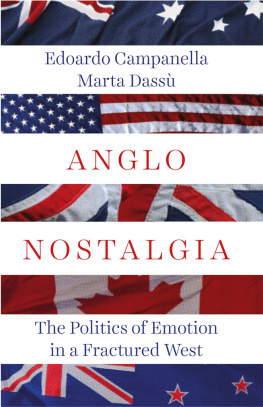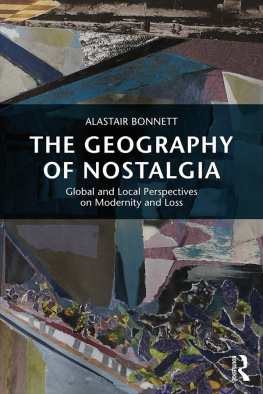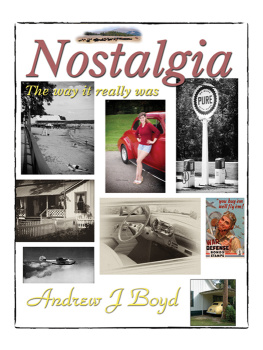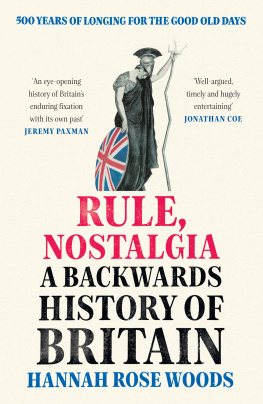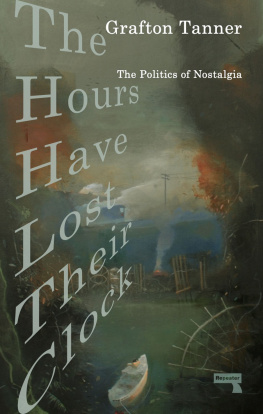ANGLO NOSTALGIA
EDOARDO CAMPANELLA
MARTA DASS
Anglo Nostalgia
The Politics of Emotion
in a Fractured West


Oxford University Press is a department of the University of Oxford. It furthers the Universitys objective of excellence in research, scholarship, and education by publishing worldwide. Oxford is a registered trade mark of Oxford University Press in the UK and certain other countries.
Published in the United States of America by Oxford University Press 198 Madison Avenue, New York, NY 10016, United States of America.
Edoardo Campanella and Marta Dass 2019
All rights reserved. No part of this publication may be reproduced, stored in a retrieval system, or transmitted, in any form or by any means, without the prior permission in writing of Oxford University Press, or as expressly permitted by law, by license, or under terms agreed with the appropriate reproduction rights organization. Inquiries concerning reproduction outside the scope of the above should be sent to the Rights Department, Oxford University Press, at the address above.
You must not circulate this work in any other form and you must impose this same condition on any acquirer.
Library of Congress Cataloging-in-Publication Data
ISBN 9780190068936 (print)
ISBN 9780190092573 (updf)
ISBN 9780190092627 (epub)
Names: Edoardo Campanella and Marta Dass
Title: Anglo Nostalgia
To Costanza and Nina
CONTENTS
PART ONE
MYTHMAKING
PART TWO
REALITY CHECK
This book stems from an attempt to understand the emotional roots of todays geopolitical disorder. Nostalgia is not the kind of topic you would expect an economist and a political scientist to address. However, in the aftermath of the Brexit vote and the election of Donald Trump, it became clear that the present is increasingly becoming a source of discomfort for large sections of the population (particularly in the West) and that nationalist leaders are keen to resort to nostalgic arguments to mobilize their citizens. In February 2017 we started to explore the idea of nostalgic nationalism applied to the Anglo-Saxon world in an article for Foreign Affairs entitled A Future of the English-Speaking Peoples. We are grateful to Kathrin Allawala Salam, then an editor at the journal and now at Foreign Policy, for accepting it and making it readable. The article triggered some interesting intellectual reactions, and we were provided with opportunities to discuss its rationale at a number of conferences organized by Aspen Institute Italia, Chatham House, the Instituto per gli Studi di Politica Internazionale (ISPI), and the European Council on Foreign Relations.
From our conversations with scholars and policymakers we immediately realized that everyone (including ourselves) was taking for granted the concept of nostalgic nationalism. In the press too, nostalgia began to be increasingly associated with the major political disruptions that were turning the global order upside down. In reality however, nostalgic nationalism had not received a clear and coherent definitionexcept in a few important books on nostalgia itself. Was it really a new form of nationalism in its own right? How does nostalgia infect the political debate? And, more importantly, why was nostalgia spreading so quickly across the whole world?
The time was ripe to analyse in greater depth an emotional syndrome that will probably shape domestic and international politics for many years to come. This is exactly what induced Michael Dwyer, managing director at Hurst Publishers, to accept our proposal for a book about the changing landscape of emotions and ideas in Western politics: Brexit was the perfect test case. We are immensely grateful to him for this opportunity.
The book focuses on the link between nostalgia and nationalism. Demographic, economic and technological forces are spreading the disease of longing at an impressive pace. Older people are struggling to keep up with a world that is changing too fast. Globalization and technological progress disrupt traditional industries, creating job opportunities for a small elite of highly qualified professionals. And immigration destabilizes self-contained local communities, questioning the traditional values that keep them together. These forces, being structural in nature, are producing a generalized sense of insecurity that jingoist leaders are addressing by promising to take back control at the national levelas in an idealized past.
At the heart of todays nationalist narrative is a promise to turn the clock back. Of course, memories of bygone eras are emotionally and historically biased. But that is how nostalgia works. It is selective by nature.
To improve our understanding of the phenomenon, we crossed the boundaries of a number of fields, well beyond our comfort zones of international relations and economics. We turned to psychology, anthropology, cultural studies, and history. We came to the conclusion that nostalgic nationalism is indeed a new form of nationalismrather than a simple populist revolt. But only in the United Kingdom, given its historical legacy, was this phenomenon so ripe that it contributed to a highly temporally regressive decision such as Brexit. The tiny majority of the highly polarized British population who voted Leave and were brainwashed with nostalgic national myths of past glories did not just want divorce from Brussels. They wanted to return the United Kingdom to a time when the country was fully sovereign and simultaneously able to play a global role. That is why this book refers in detail to the debate over the Anglosphere as a geopolitical alternative to the European Union.
Our Anglo-Saxon interlocutors were intrigued that two Italians had dared intrude on their debate and delve into what many perceive as a highly emotional topic. Our bet is that two outsiders, while strongly connected to the Anglo-American world through a number of policy, academic, and corporate connections, could provide an interesting perspective on these issues.
Along the way, we benefited from the expertise of a number of collaborators. Ph.D. candidates Niccol Serri and Edoardo Andreoni provided excellent research assistance for some of the historical chapters. The journalist Hannah Roberts improved our understanding of the nostalgic flavour that characterized the United Kingdom in the years leading up to the Brexit referendum. At Hurst, we are indebted to Lara Weisweiller-Wu for her patience, competence, and steadfastness, as well as to the rest of the editorial and marketing staff. We are also grateful to Gyneth Sick and the team at the journal Aspenia for running an editorial on nostalgia. Edoardo also had the opportunity to write a long essay on a related topic for Project Syndicate. He is grateful to Ken Murphy, Romand Frydman, and Nicolas Chatara-Morse for supporting this idea.
A number of friends and colleagues commented on part of the draft or the entire manuscript: Pramit Pal Chaudhuri (Rhodium Group), Stephanie Flanders (Bloomberg Economics), Timothy Garton Ash (Oxford University), Christopher Hill (Cambridge University), Ivan Krastev (The New York Times and Centre for Liberal Strategies in Sofia), Charles A. Kupchan (Council on Foreign Relations), Walter Russell Mead (Bard College), Roberto Menotti (Aspen Institute Italia), Larry Summers (Harvard University), George Tsarouchas (Dialectica). We are also very grateful to two anonymous reviewers whose comments and suggestions contributed greatly to improving the book.

